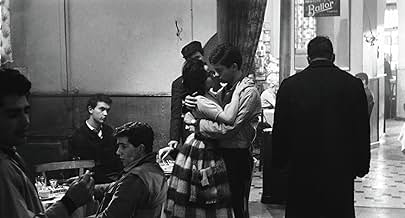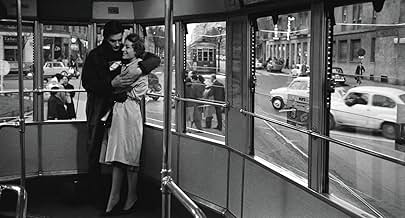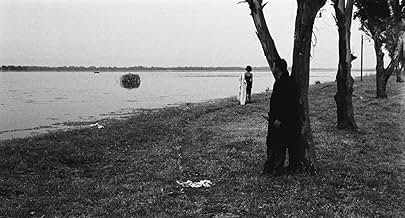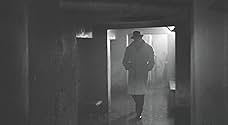AVALIAÇÃO DA IMDb
8,2/10
25 mil
SUA AVALIAÇÃO
Tendo sido recentemente desenraizado em Milão, Rocco e seus quatro irmãos procuram um novo modo de vida quando uma prostituta se mete entre Rocco e seu irmão, Simone.Tendo sido recentemente desenraizado em Milão, Rocco e seus quatro irmãos procuram um novo modo de vida quando uma prostituta se mete entre Rocco e seu irmão, Simone.Tendo sido recentemente desenraizado em Milão, Rocco e seus quatro irmãos procuram um novo modo de vida quando uma prostituta se mete entre Rocco e seu irmão, Simone.
- Direção
- Roteiristas
- Artistas
- Indicado para 2 prêmios BAFTA
- 12 vitórias e 10 indicações no total
Spyros Fokas
- Vincenzo Parondi
- (as Spiros Focas)
Avaliações em destaque
This is perhaps Visconti's most powerful work, though today it may seem a little overwrought and dated.
"Rocco e sui fratelli" from 1960 is about a rural family (Katina Paxinou as Rosaria, Alain Delon as Rocco, Renato Salvatori as Simone, Spiros Focás as Vincenzo, Max Cartier as Ciro and Rocco Vidolazzi as Luca) who move from southern Italy to Milano, hoping to make a better life for themselves.
The brothers are all different, and therein lies the story, with the focus particularly on Rocco (Delon), a gentle soul who cares about his family and his family's honor, and Simone (Salvatori), a man with an addictive personality who only cares about himself.
Both Rocco and Simone fall for the same woman, a hooker (Anne Girardot) and come to blows - physically, since both Simone and Rocco train as boxers.
This isn't always an easy film to watch as it contains violence, rape, and murder. It also is extremely melodramatic by today's standards, with Paxinou's strong performance as the mother perhaps being viewed today as over the top. Acting styles have changed.
It's also a rather misogynistic film - well, it is Italy, it is another time period, and I'm not one who believes in cancel culture. It is also overly long - I saw the cut version, I believe, 168 minutes. I think certain scenes were cut due to censorship.
Though the film is in black and white, the look of Italy is amazing and expansive, as is the acting, particularly from Delon and Salvatori as they come up against one another in a biblical story. Claudia Cardinale pre-nosejob has a small role.
Delon, of course, is gorgeous. Hard to believe he'll be 85 this year.
"Rocco e sui fratelli" from 1960 is about a rural family (Katina Paxinou as Rosaria, Alain Delon as Rocco, Renato Salvatori as Simone, Spiros Focás as Vincenzo, Max Cartier as Ciro and Rocco Vidolazzi as Luca) who move from southern Italy to Milano, hoping to make a better life for themselves.
The brothers are all different, and therein lies the story, with the focus particularly on Rocco (Delon), a gentle soul who cares about his family and his family's honor, and Simone (Salvatori), a man with an addictive personality who only cares about himself.
Both Rocco and Simone fall for the same woman, a hooker (Anne Girardot) and come to blows - physically, since both Simone and Rocco train as boxers.
This isn't always an easy film to watch as it contains violence, rape, and murder. It also is extremely melodramatic by today's standards, with Paxinou's strong performance as the mother perhaps being viewed today as over the top. Acting styles have changed.
It's also a rather misogynistic film - well, it is Italy, it is another time period, and I'm not one who believes in cancel culture. It is also overly long - I saw the cut version, I believe, 168 minutes. I think certain scenes were cut due to censorship.
Though the film is in black and white, the look of Italy is amazing and expansive, as is the acting, particularly from Delon and Salvatori as they come up against one another in a biblical story. Claudia Cardinale pre-nosejob has a small role.
Delon, of course, is gorgeous. Hard to believe he'll be 85 this year.
ROCCO AND HIS BROTHERS is a crime drama about the struggle of a poor Italian family from the South with an unknown and "modern" city life. This family drama is full of emotional turmoils and tragic upheavals.
The four sons of a poor rural Italian family from the South travel with their mother to join their oldest brother in Milan. Each of the five brothers must adjust to a new life in the big city. Their mother is a strong bond that connects them. However, it is difficult to be a harmonious family in the big city. A beautiful prostitute is a cause of discord in their family...
Every new experience in the lives of these people is a kind of incident. The protagonists are not able to change their lives. The family is what makes life. Life without the family does not make sense. This is a realistic view of a bitter life, which have gradually extinguished. Emotions are not consistent with the nature of some of the protagonists. Therefore, strong outbursts of emotions are a little bit grotesque. Jealousy, devotion to family or an unrequited love are completely normal life situations. In this case, these are incurable life's wounds. Emotionalism and realism are so intertwined that it is impossible to draw a clear line in some key scenes. Therefore, certain events in this film can not be called a life experience, more a tragedy.
The atmosphere is obscured. It is a reflection of a life in the fog, without a clear future. Some scenes are truly shocking. Their significance is even greater, because, human spirit is excommunicated through these scenes.
Alain Delon as Rocco Parondi is a loyal, generous and naive young man. He carries a burden of deep pain and family responsibilities on his shoulders. A character, who is trying to find the best in people. His performance has certainly captured the hearts of many viewers.
Annie Girardot as Nadia has offered a great performance. A young and beautiful prostitute is torn between two philosophies of life. However, she is not able to choose between a false urban hedonism and true love. Others have chosen for her. It is a tragedy of her character. Renato Salvatori as Simone Parondi is a restless and depressed loafer. A violent man, who can not settle down. The big city is full of good opportunities, but some of them may be a great challenge for an inexperienced young man.
Their support are Katina Paxinou (Rosaria Parondi) as a hysterical and helpless mother, Max Cartier (Ciro Parondi) is a kind of voice of reason, Spiros Focás (Vincenzo Parondi) is a quiet and calm oldest brother and Claudia Cardinale (Ginetta) is his emotional wife.
This is a dynamic story about members of Parondi family which is falling apart under an influence of crime, mutual misunderstanding and superstition.
The four sons of a poor rural Italian family from the South travel with their mother to join their oldest brother in Milan. Each of the five brothers must adjust to a new life in the big city. Their mother is a strong bond that connects them. However, it is difficult to be a harmonious family in the big city. A beautiful prostitute is a cause of discord in their family...
Every new experience in the lives of these people is a kind of incident. The protagonists are not able to change their lives. The family is what makes life. Life without the family does not make sense. This is a realistic view of a bitter life, which have gradually extinguished. Emotions are not consistent with the nature of some of the protagonists. Therefore, strong outbursts of emotions are a little bit grotesque. Jealousy, devotion to family or an unrequited love are completely normal life situations. In this case, these are incurable life's wounds. Emotionalism and realism are so intertwined that it is impossible to draw a clear line in some key scenes. Therefore, certain events in this film can not be called a life experience, more a tragedy.
The atmosphere is obscured. It is a reflection of a life in the fog, without a clear future. Some scenes are truly shocking. Their significance is even greater, because, human spirit is excommunicated through these scenes.
Alain Delon as Rocco Parondi is a loyal, generous and naive young man. He carries a burden of deep pain and family responsibilities on his shoulders. A character, who is trying to find the best in people. His performance has certainly captured the hearts of many viewers.
Annie Girardot as Nadia has offered a great performance. A young and beautiful prostitute is torn between two philosophies of life. However, she is not able to choose between a false urban hedonism and true love. Others have chosen for her. It is a tragedy of her character. Renato Salvatori as Simone Parondi is a restless and depressed loafer. A violent man, who can not settle down. The big city is full of good opportunities, but some of them may be a great challenge for an inexperienced young man.
Their support are Katina Paxinou (Rosaria Parondi) as a hysterical and helpless mother, Max Cartier (Ciro Parondi) is a kind of voice of reason, Spiros Focás (Vincenzo Parondi) is a quiet and calm oldest brother and Claudia Cardinale (Ginetta) is his emotional wife.
This is a dynamic story about members of Parondi family which is falling apart under an influence of crime, mutual misunderstanding and superstition.
10mido505
Although the French Nouvelle Vague gets all the press, it is the Italian neorealist movement that has had the greatest impact on American cinema. Let's face it, aside from some of Godard's editing tricks in Breathless, what kind of influence did the Nouvelle Vague really have? Godard. Truffaut. Chabrol. Rohmer. Rivette. Resnais. Decent filmmakers all, but, when one looks closely, more interesting for their influences than for their influence. But the Italians, oh, the Italians. Bava. Fellini. Rossellini. De Sica. Bertolucci. Visconti. I think it is safe to say that, without the films of these incredible innovators, American movies would have rotted away into nothing. It was the post WWII Italian neorealist movement, and its heady brew of Marxism and melodrama, that inflamed the imaginations of filmmakers like Francis Ford Coppola and Martin Scorsese, and led them, especially in Coppola's case, to use many of the same personnel on their own productions. Vittorio Storaro. Giuseppe Rotunno. Nino Rota. Ferdinando Scarfiotti. Danilo Donati. Where would the great American films of the seventies be without the contributions of these astoundingly talented artists and technicians?
Rocco and His Brothers is a jaw-dropping work, so ferociously brilliant that it takes your breath away. As a Visconti fan, I have been waiting to watch it for years. Yet, despite my eagerness, the DVD sat on top of the television for two weeks before I finally popped it in. Curiously, I had the same reaction to The Leopard, another Visconti masterwork, a couple of years ago. As I get older, I find it harder and harder to abandon myself to a work of art. Great works of art force one to give oneself over to them completely, suspend judgment, accept them unconditionally. When one is young and unformed, the process is easy; as one gets older, and the carapace of personality hardens, the process becomes more difficult. There is a good reason for this; the effort is often not worth while; one comes out of the experience diminished, drained, let down.
Rocco and His Brothers holds no such disappointment. It is a vast, capacious work, complex, generous, passionate, and intensely moving. The talent on display here defies analysis: Alain Delon is luminous as the saintly Rocco; Katina Paxinou achieves Shakespearean grandeur as the Parondi family matriarch; Giuseppe Rotunno's cinematography is starkly beautiful; and Nino Rota's music is heartbreaking. I do not want to give too much of this film away, but I must point out that, contrary to what some reviews on this site have to say, this film is not just about the corruption that big city life brings to a peasant family. Rocco may be a saint, but his all-forgiving nature drives much of the tragedy that unfolds. It is Ciro, the compassionate but just brother, and successful entrant into Milan's urban proletariat, who will lead the family into an uncertain but perhaps hopeful future.
Let me just finish by pointing out how wonderful it is to see a movie that ends with a meaningful and distinctive final shot. You don't see much of that anymore.
Rocco and His Brothers is a jaw-dropping work, so ferociously brilliant that it takes your breath away. As a Visconti fan, I have been waiting to watch it for years. Yet, despite my eagerness, the DVD sat on top of the television for two weeks before I finally popped it in. Curiously, I had the same reaction to The Leopard, another Visconti masterwork, a couple of years ago. As I get older, I find it harder and harder to abandon myself to a work of art. Great works of art force one to give oneself over to them completely, suspend judgment, accept them unconditionally. When one is young and unformed, the process is easy; as one gets older, and the carapace of personality hardens, the process becomes more difficult. There is a good reason for this; the effort is often not worth while; one comes out of the experience diminished, drained, let down.
Rocco and His Brothers holds no such disappointment. It is a vast, capacious work, complex, generous, passionate, and intensely moving. The talent on display here defies analysis: Alain Delon is luminous as the saintly Rocco; Katina Paxinou achieves Shakespearean grandeur as the Parondi family matriarch; Giuseppe Rotunno's cinematography is starkly beautiful; and Nino Rota's music is heartbreaking. I do not want to give too much of this film away, but I must point out that, contrary to what some reviews on this site have to say, this film is not just about the corruption that big city life brings to a peasant family. Rocco may be a saint, but his all-forgiving nature drives much of the tragedy that unfolds. It is Ciro, the compassionate but just brother, and successful entrant into Milan's urban proletariat, who will lead the family into an uncertain but perhaps hopeful future.
Let me just finish by pointing out how wonderful it is to see a movie that ends with a meaningful and distinctive final shot. You don't see much of that anymore.
10Bocio
Visconti at his peak. We are in the fifties, when Italian economy experiences a post-war boom. A Sicilian family arrives to Milan running from south's poverty. They dream with a new life at the industrial pole of the north. But Milan is not precisely a land of opportunities. Exploitation and xenophobia is the common destiny for those who came from south of the country. This film is a perfect sequel to "La Terra Tembla", one of the earliest Visconti's looks on Marxism. The hopes and lives of this five brother's family sink onto a pit at the same time as they destroy themselves. "Rocco and ..." is intensely played by the entire cast, including a young and delicate Alain Delon as the idealistic Rocco, an exquisite Annie Girardot as a prostitute trying to survive to her own hell and a terrific Renato Salvatori. But is the figure of the peasant mother, played superbly by Katina Paxinou, the most remarkable piece of this operatic story. Claudia Cardinale made some kind of Italian debut in this film. Nino Rota composes his most pitiful score and the black and white photography is stunning. The scene at the rooftop of Milan's Duomo is one of my all-time favorites. The American version is usually cut so try to find the original or some DVD restoration. A must see film.
I was lucky enough to catch this extraordinary film late last night on a cable channel. It's about a widow from southern Italy who moves to Milan with her five sons. Gradually they become embroiled in the big city, some becoming corrupted by its ways, others profiting. Rocco, played by Alain Delon, is an innocent, looking at his brothers and life in general with saintly patience. When his beneficent attitude comes under pressure, he doesn't give in to self-interest, choosing to sacrifice his own happiness, and that of the woman he loves, for his family. Family is really what 'Rocco and his Brothers' is all about. I've never got into Visconti, but seeing this film has made me want to see more of his work. Also, this move has one of the most powerful images I've ever seen, as the maddened Simone advances towards the doomed prostitute Nadia. It's an image so remarkable I actually shouted aloud when I saw it. I urge you to see this film. It's a remarkable, passionate, beautifully photographed drama that will stay with you for a long time.
Alain Delon's Top 10 Films, Ranked
Alain Delon's Top 10 Films, Ranked
To celebrate the life and career of Alain Delon, the actor often credited with starring in some of the greatest European films of the 1960s and '70s, we rounded up his top 10 movies, ranked by IMDb fan ratings.
Você sabia?
- CuriosidadesFrancis Ford Coppola was such a big fan of this film that he hired its composer, Nino Rota, to score his 1972 masterwork, O Poderoso Chefão (1972).
- Citações
Ciro Parondi: Brothers or not, we're seeds taken from the same sack meant to bear fruit. A seed gone bad must be weeded out. Just like when we cleaned lentils.
- Versões alternativasOriginally released at 180 minutes in Italy. Local censorship forced director Visconti to cut a few sequences (including scenes from Nadia's rape); the film was subsequently shortened even more for foreign distribution. Director of photography Giuseppe Rotunno has prepared a restored full version, which has been re-released in 1991.
- ConexõesFeatured in Sunday Night: Man of Three Worlds: Luchino Visconti (1966)
Principais escolhas
Faça login para avaliar e ver a lista de recomendações personalizadas
- How long is Rocco and His Brothers?Fornecido pela Alexa
Detalhes
Bilheteria
- Faturamento bruto mundial
- US$ 22.013
- Tempo de duração
- 2 h 59 min(179 min)
- Cor
- Mixagem de som
- Proporção
- 1.85 : 1
Contribua para esta página
Sugerir uma alteração ou adicionar conteúdo ausente

![Assistir a Trailer [OV]](https://m.media-amazon.com/images/M/MV5BNmE0NzFhNTAtOWYzMi00NTNkLWIwZTEtMTVlZjBkOTc1YWEzXkEyXkFqcGdeQXRyYW5zY29kZS13b3JrZmxvdw@@._V1_QL75_UX500_CR0)
































